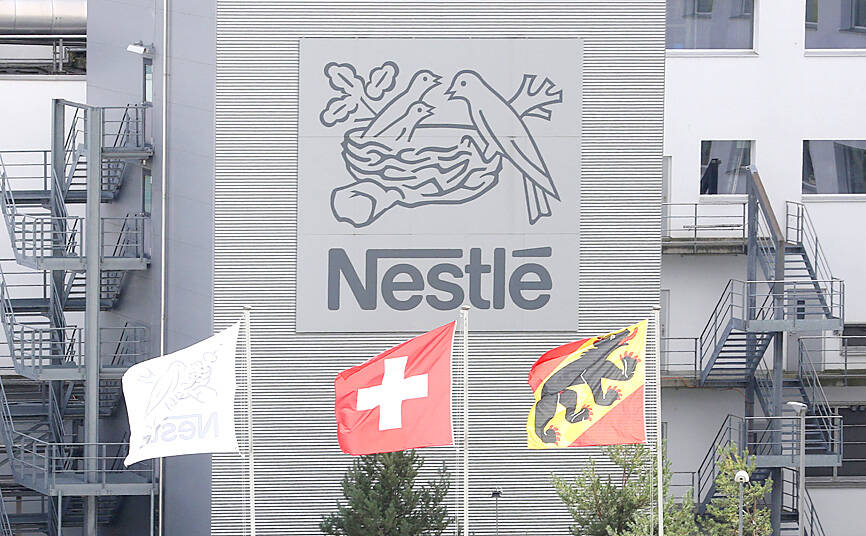Nestle SA has abandoned pledges to make major brands, including KitKat and Perrier, carbon neutral, joining a nascent corporate pushback against programs that let polluters compensate for their own greenhouse gas emissions by investing in efforts to reduce them elsewhere.
The world’s biggest food company joins airline EasyJet PLC and Gucci owner Kering SA in backing away from so-called carbon offsetting as a way to meet net zero emissions targets.
Consumer groups have said the practice is misleading for shoppers and does not always mean emissions are falling.

Photo: Reuters
Nestle is shifting toward in-house programs to reduce greenhouse gas emissions in its operations and supply chain, a spokesperson said.
The Swiss food company also dropped plans to make plant-based meal lines Sweet Earth Foods and Garden Gourmet carbon neutral.
Carbon-offset programs do not really reduce businesses’ impact on the climate, critics say, even though the label does have appeal for well-meaning consumers.
“If you’re a consumer in the supermarket, you have no way to know how much of a carbon neutral claim is from actual emissions reductions and how much is from these dubious carbon-offsetting projects,” said Emma Calvert, a food policy officer at European consumer rights organization BEUC, which wants to ban “carbon neutral” claims on food.
Multinationals are under pressure to help prevent the planet from heating up more than 1.5oC.
The net-zero standard requires companies to set long-term science-based targets to cut all possible emissions before 2050.
While Nestle is abandoning carbon offsets, it still aims to achieve net zero in 2050, planning to reach that through measures often known as “insets.” That includes actions like helping farmers shift to regenerative agriculture, restoring wetlands, protecting habitats for pollinators and planting hedgerows to prevent soil erosion.
However, insets are also problematic. It is hard to check the methodologies that companies use and there are no global verification standards, the NewClimate Institute said.
Those measures could give consumers a false impression of a company’s impact on climate, the group said.
Carbon neutrality claims can play well with consumers as they can assume it means fewer greenhouse gas emissions. A study conducted by a German consumer organization concluded that carbon neutrality claims improve a product’s image even when there is no guarantee that an environmental benefit actually exists.
Greenwashing claims can backfire for companies, too. Danone SA is the target of a US lawsuit over the carbon neutral label on its Evian waters. A Swedish court fined and banned European dairy group Arla Foods from using the term “net zero climate footprint” in the marketing of its products sold in the country. Nestle is facing a legal challenge from a French consumer group over its claim that Nespresso is carbon neutral.
Despite the change in approach, some of Nestle’s brands are still touting their carbon neutral successes. The Web site of vitamin business Garden of Life says it reached that status six months ahead of schedule in 2021.

CAUTIOUS RECOVERY: While the manufacturing sector returned to growth amid the US-China trade truce, firms remain wary as uncertainty clouds the outlook, the CIER said The local manufacturing sector returned to expansion last month, as the official purchasing managers’ index (PMI) rose 2.1 points to 51.0, driven by a temporary easing in US-China trade tensions, the Chung-Hua Institution for Economic Research (CIER, 中華經濟研究院) said yesterday. The PMI gauges the health of the manufacturing industry, with readings above 50 indicating expansion and those below 50 signaling contraction. “Firms are not as pessimistic as they were in April, but they remain far from optimistic,” CIER president Lien Hsien-ming (連賢明) said at a news conference. The full impact of US tariff decisions is unlikely to become clear until later this month

With an approval rating of just two percent, Peruvian President Dina Boluarte might be the world’s most unpopular leader, according to pollsters. Protests greeted her rise to power 29 months ago, and have marked her entire term — joined by assorted scandals, investigations, controversies and a surge in gang violence. The 63-year-old is the target of a dozen probes, including for her alleged failure to declare gifts of luxury jewels and watches, a scandal inevitably dubbed “Rolexgate.” She is also under the microscope for a two-week undeclared absence for nose surgery — which she insists was medical, not cosmetic — and is

GROWING CONCERN: Some senior Trump administration officials opposed the UAE expansion over fears that another TSMC project could jeopardize its US investment Taiwan Semiconductor Manufacturing Co (TSMC, 台積電) is evaluating building an advanced production facility in the United Arab Emirates (UAE) and has discussed the possibility with officials in US President Donald Trump’s administration, people familiar with the matter said, in a potentially major bet on the Middle East that would only come to fruition with Washington’s approval. The company has had multiple meetings in the past few months with US Special Envoy to the Middle East Steve Witkoff and officials from MGX, an influential investment vehicle overseen by the UAE president’s brother, the people said. The conversations are a continuation of talks that

Alchip Technologies Ltd (世芯), an application-specific integrated circuit (ASIC) designer specializing in artificial-intelligence (AI) chips, yesterday said that small-volume production of 3-nanometer (nm) chips for a key customer is on track to start by the end of this year, dismissing speculation about delays in producing advanced chips. As Alchip is transitioning from 7-nanometer and 5-nanometer process technology to 3 nanometers, investors and shareholders have been closely monitoring whether the company is navigating through such transition smoothly. “We are proceeding well in [building] this generation [of chips]. It appears to me that no revision will be required. We have achieved success in designing